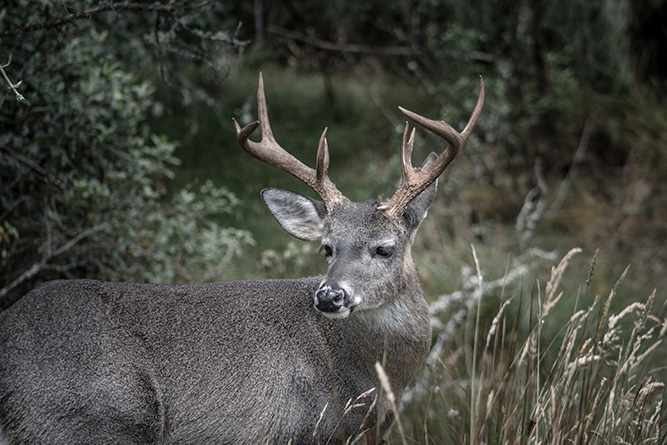The Mule Deer, a majestic member of the deer family, is a captivating species that roams the diverse landscapes of North America. These graceful creatures are known for their remarkable antlers and unique behavior.
Table of Contents
Species Data
- Class: Mammalia
- Order: Artiodactyla
- Family: Cervidae
- Scientific Name: Odocoileus hemionus
- Life Span: 9 to 11 years
- Height: Up to 100-120 cm (39-47 inches)
- Weight: 100-300 pounds (45-136 kilograms)
Description
The Mule Deer is a robust herbivore, named for its large, mule-like ears. Its fur varies from reddish-brown to gray, with a distinctive white rump patch. One of its most striking features is the branching antlers of males, which they shed and regrow annually.
Appearance
These deer are easily recognizable by their unique ears, which can rotate independently to detect sounds from various directions. Mule Deer exhibit sexual dimorphism, with males (bucks) being larger and having more extensive antlers than females (does).
Behavior
Mule Deer are known for their agility and leaping ability. They are crepuscular, meaning they are most active during dawn and dusk. During the mating season, bucks engage in competitive displays, including vocalizations and antler battles.
Habitat
Where does Mule Deer live? Their habitat ranges from mountainous regions to arid deserts. They are adaptable creatures, able to thrive in a variety of environments, from dense forests to open grasslands.
Diet and Nutrition
What does Mule Deer Eat? Mule Deer are herbivores, primarily feeding on plants, leaves, and shrubs. Their complex stomachs enable them to efficiently digest fibrous plant material.
Mating Habits
Mule Deer typically mate in the fall, with a gestation period of around 200 days. Does gives birth to one to three fawns, which they carefully nurse and protect.
Mating Behavior
- Reproduction Season: Fall
- Pregnancy Duration: Approximately 200 days
- Baby Carrying: Does nurse and protect their fawns
- Independent Age: Fawns become independent at around 6 months
- Female Name: Doe
- Male Name: Buck
- Baby Name: Fawn
5 Fun Facts for Kids
- Mule Deer can jump up to 2.5 meters high, which is like leaping over a car!
- Their large ears can rotate like radar dishes to listen for predators.
- Mule Deer are excellent swimmers and can cross rivers and streams with ease.
- Bucks grow new antlers each year, and the size can tell you their age.
- These deer can run at speeds of up to 45 miles per hour, as fast as a race car on city streets!


